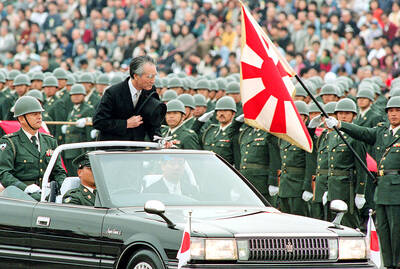China’s detention of internationally renowned artist Ai Weiwei (艾未未) has sparked a petition urging his release, exposing alarm among China’s liberal intellectuals who see his case as a test of how far a crackdown to stifle dissent could reach.
Chinese officials have not commented on the whereabouts of Ai, who was stopped on Sunday from boarding a flight from Beijing to Hong Kong and taken away by border police. There is little doubt he has joined a lengthening list of dissidents and activists in detention or informal custody.
Ai has been out of contact; his mobile phone is off.
His wife, Lu Qing (路青), said police officers would not give her any information, and this detention appeared more serious than his recent run-ins with the government.
“This time it’s extremely serious,” she said, adding that she was considering retaining a lawyer.
“They searched his studio and took discs and hard drives and all kinds of stuff, but the police haven’t told us where he is or what they’re after. There’s no information about him,” Lu said.
The disappearance of Ai, a burly, bearded 53-year-old avant-garde artist and designer who had a hand in designing the Bird’s Nest stadium for the 2008 Beijing Olympics, has drawn condemnation from Western governments.
The US, Britain and Germany denounced China’s growing use of extra-judicial detentions against dissidents that the Chinese Communist Party (CCP) fears could spread calls for protests inspired by Middle Eastern uprisings.
Yesterday, the US embassy and the EU delegation in Beijing repeated those denunciations, illustrating how Ai’s case could escalate into a diplomatic row.
Chinese activists are also increasingly concerned about Ai’s detention, and supporters in China and abroad promoted an online drive urging authorities to free him.
“Today, every one of us could become an Ai Weiwei,” Ai Xiaoming (艾曉明), an academic and documentary-maker in southern China, who is not related to Ai Weiwei, wrote in an essay about the petition that circulated on overseas Chinese Internet sites.
“What I meant was that Ai Weiwei is an artist, so he has more prominence than many others, but there are many other people facing the same situation,” she said in a telephone interview yesterday.
“But I also meant that we can all also try to act like Ai Weiwei and speak out,” she said.
The online petition to “free Ai Weiwei” was launched on a Twitter microblog site (twitition.com/ao9m7), which China’s wall of Internet censorship stops most Chinese people from seeing.
By yesterday afternoon, it had more than 1,500 signatories, many of them apparently Chinese with the skills and technology to jump past the censorship barriers.
Inquiries about Ai on China’s most popular microblogging site, Sina.com’s Weibo, are blocked, but many activists in China have followed the case by overcoming censorship or by word of mouth.
Ai is the most internationally prominent target of a burst of detentions since February. While dozens of activists have been released, dozens remain locked away and at least three have been formally arrested on broad subversion charges often used to jail dissidents.
Wang Ling (王玲), the wife of Teng Biao (滕彪), one of Beijing’s most prominent human rights lawyers, said that police officers told her Teng was “under investigation,” but they declined to say what for or to let her visit him.
The crackdown goes beyond recent cycles of political tightening, Chinese intellectuals said. If Teng or other prominent lawyers are formally arrested, the outcry against the CCP at home and abroad would be sure to grow.
“The most disturbing thing is that there is no sign of the government relaxing its grip this time around,” Amnesty International’s Asia-Pacific director Sam Zarifi said in a statement. “We fear that this is just a taste of things to come.”

The Venezuelan government on Monday said that it would close its embassies in Norway and Australia, and open new ones in Burkina Faso and Zimbabwe in a restructuring of its foreign service, after weeks of growing tensions with the US. The closures are part of the “strategic reassignation of resources,” Venezueland President Nicolas Maduro’s government said in a statement, adding that consular services to Venezuelans in Norway and Australia would be provided by diplomatic missions, with details to be shared in the coming days. The Norwegian Ministry of Foreign Affairs said that it had received notice of the embassy closure, but no

A missing fingertip offers a clue to Mako Nishimura’s criminal past as one of Japan’s few female yakuza, but after clawing her way out of the underworld, she now spends her days helping other retired gangsters reintegrate into society. The multibillion-dollar yakuza organized crime network has long ruled over Japan’s drug rings, illicit gambling dens and sex trade. In the past few years, the empire has started to crumble as members have dwindled and laws targeting mafia are tightened. An intensifying police crackdown has shrunk yakuza forces nationwide, with their numbers dipping below 20,000 last year for the first time since records

EXTRADITION FEARS: The legislative changes come five years after a treaty was suspended in response to the territory’s crackdown on democracy advocates Exiled Hong Kong dissidents said they fear UK government plans to restart some extraditions with the territory could put them in greater danger, adding that Hong Kong authorities would use any pretext to pursue them. An amendment to UK extradition laws was passed on Tuesday. It came more than five years after the UK and several other countries suspended extradition treaties with Hong Kong in response to a government crackdown on the democracy movement and its imposition of a National Security Law. The British Home Office said that the suspension of the treaty made all extraditions with Hong Kong impossible “even if

Former Japanese prime minister Tomiichi Murayama, best known for making a statement apologizing over World War II, died yesterday aged 101, officials said. Murayama in 1995 expressed “deep remorse” over the country’s atrocities in Asia. The statement became a benchmark for Tokyo’s subsequent apologies over World War II. “Tomiichi Murayama, the father of Japanese politics, passed away today at 11:28am at a hospital in Oita City at the age of 101,” Social Democratic Party Chairwoman Mizuho Fukushima said. Party Secretary-General Hiroyuki Takano said he had been informed that the former prime minister died of old age. In the landmark statement in August 1995, Murayama said